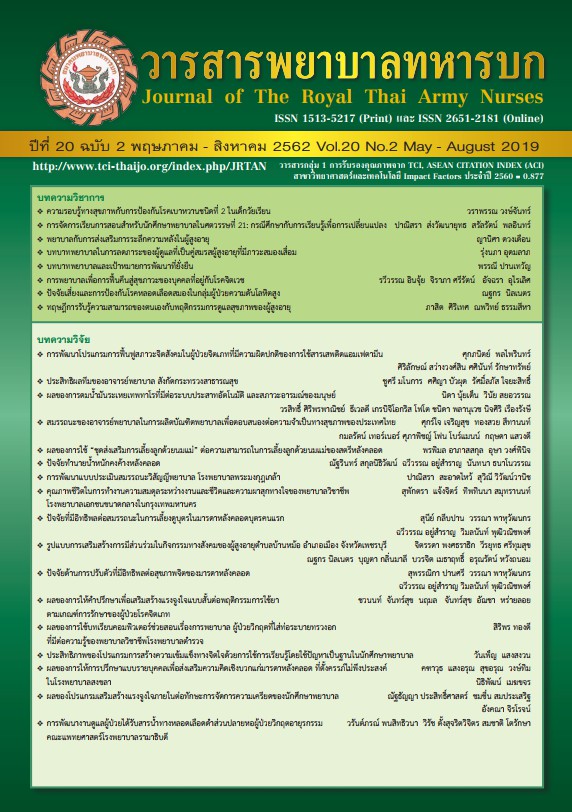Patient Safety Culture: Perception of State Hospital Nurses
Keywords:
patient safety culture, Nurses’ perceptionAbstract
The purpose of this descriptive study was to explore patient safety culture as perceived by nurses in state hospitals and compare perception of patient safety culture among nurses in different level of hospitals. Five hundred registered nurses were recruited by stratify random sampling of 10 % of the number of the regional hospital and general hospital.Data were collected using a 5-point Likert scale of the Hospital Survey on Patient Safety developed by AHRQ with Chronbach alpha coefficient of .79. Data were analyzed using frequency, percentage, mean, standard deviation, and independent T test.
Results showed that the average perception scores of patient safety culture regarding management of safety, working safety, communication within units were at a high level and working of the supervisor/head of unit was at a moderate level. Supporting for safety culture regarding team work was not statistically significantly different (p = .11) between nurses of regional hospital and general hospital. Ninety four percent of nurses reported experience of reporting adverse event and the majority of them reported ≥21 times. The report of near miss incidence in general hospital was statistically significantly higher than that of regional hospital (p = .02). Nursing administrators should raise awareness on patient safety among nurses in regional and general hospitals and set policy on patient safety culture in their organizations.
Downloads
References
World Health Organization. Patient safety: Making health care safer. Geneva: World Health Organization Press; 2017.
Tobias C, Bezerra ALQ, Moreira IA, Paranaguá TTB, Silva AEBC. Knowledge of nurses on the culture of patient safety in university hospital. J Nurs UFPE on line, Recife 2016; 10 (3):1071-79.
Clancy CM, Farquhar MB, Sharp BA. Patient safety in nursing practice. J Nurs Care Qual 2005; 20 (3):193-7.
The Health Care Accreditation Institute. (Public Organization). WHO patient safety curriculum guide: Multidisciplinary code. (Thai). Nonthaburi: D-ONE BOOKS; 2015. (in Thai)
Paranaguá TT, Bezerra AL, dos Santos AL, Silva AE. Prevalence and factors associated with incidents related to medication in surgical patients. Revista da Escola de Enfermagem da USP 2014; 48 (1):41-8
Thawon A, Boonme, P, Ketchu, K. Registered nurses’ perception on patient safety culture and the development of patient safety in Phayao hospital. J Heal Sce Res 2014; 8 (2): 6-16. (in Thai).
Rizalar, S. and Topcu SY. The patient safety culture perception of Turkish nurses who work in operating room and intensive care unit. Pak J Med Sci 2017; 33 (2):374–79. DOI: 10.12669/ pjms. 332.11727.
Carlesi KC, Padilha KG, Toffoletto MC, Henriquez- Roldán C, Juan MAC. Patient safety incidents and nursing workload science research 2017; 8 (2):6-16. DOI: 10.1590/1518-8345.1280.2841.
Stergiopoulos S, Brown CA, Felix T, Grampp G, Getz A. A survey of adverse event reporting practices among US healthcare professionals. Drug Safety Journal 2016; 39 (11): 1117-27. DOI: 10.1007/s40264-016-0455-4.
Pichert JW, Moore IN, Hickson GB. Professionals promoting professionalism. The Joint Commission Journal on Quality and Patient Safety 2011; 37 (10): 446.
Okuyama A, Wagner C, Bijnen B. Speaking up for patient safety by hospital-based health care professionals: A literature review. BMC Health Serv Res 2014; 14-61. DOI: 10.1186/1472-6963-14-61.
Oliveira KA, Tonini NS, Nicola AL. Leadership and patient safety culture: Perceptions of professionals in a university hospital 2016; 4387-4398. DOI: 10.9789/2175-5361. 2016. v8i2.4387-4398.
Toraldo DM, Vergari U., Toraldom M. Medical malpractice, defensive medicine and role of the “media” in Italy. Multidiscip Respir Med 2015; 10:12.
Hall LH, Johnson J, Watt I, Tsipa A,O’Connor, DB. Health care Staff wellbeing, burnout, and patient safety: A systematic review PLoS One Journal 2016; 11 (7): e0159015; DOI:10.1371/ journal.pone.0159015.
Downloads
Published
How to Cite
Issue
Section
License
บทความหรือข้อคิดเห็นใดใดที่ปรากฏในวารสารพยาบาลทหารบกเป็นวรรณกรรมของผู้เขียน ซึ่งบรรณาธิการหรือสมาคมพยาบาลทหารบก ไม่จำเป็นต้องเห็นด้วย
บทความที่ได้รับการตีพิมพ์เป็นลิขสิทธิ์ของวารสารพยาบาลทหารบก
The ideas and opinions expressed in the Journal of The Royal Thai Army Nurses are those of the authors and not necessarily those
of the editor or Royal Thai Army Nurses Association.






